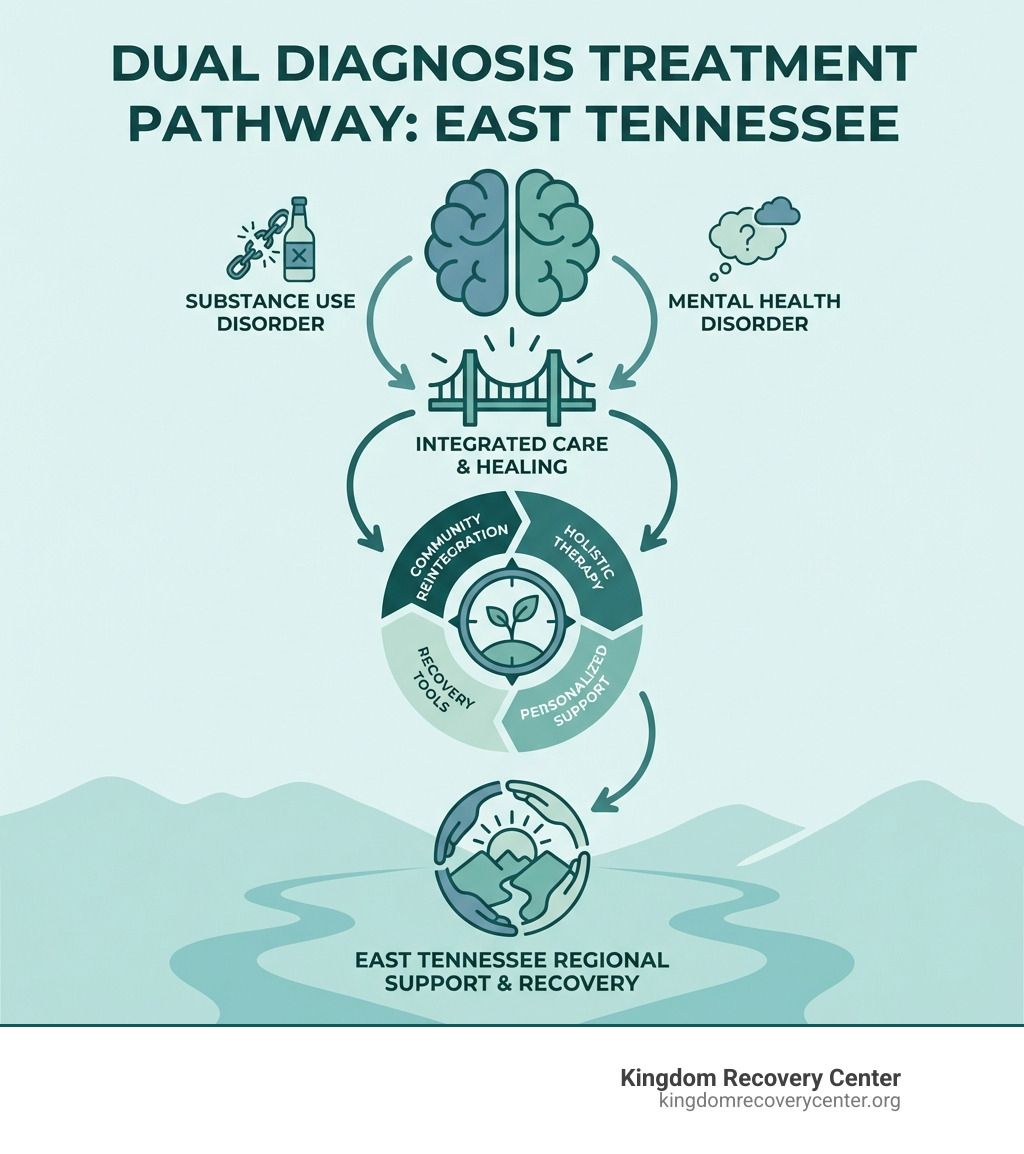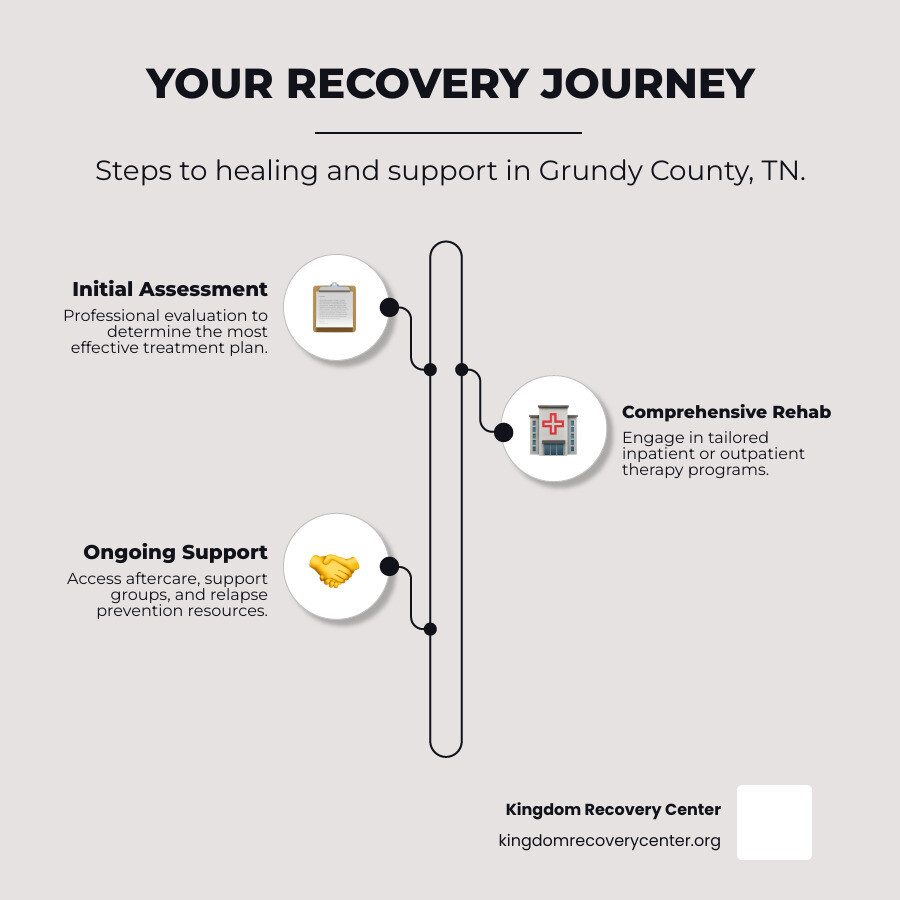
Unique Aspects of Tennessee-Based Recovery Services
<!– /wp:heading –></p>
Tennessee-based recovery services emphasize a personalized strategy that integrates strict adherence to proven methods, ensuring that each client receives treatment under a robust standard of
care. Expert clinicians carefully manage medications such as benzodiazepines to support recovery, mirroring quality practices seen in regions like Texas and also partnerships with providers such as Cigna.</p>
These services stand out for their practical approach, combining clinical expertise with tailored support to address individual recovery needs. Professionals apply first-hand knowledge to reinforce adherence and also deliver effective treatment plans, ensuring all patients experience high-quality care in alignment with the established standard of care.</p>
Real-Life Success Stories From Rehab

Professional treatment transformed lives, as witnessed in compelling testimonials from Tennessee rehab clients. Stories reveal how structured care and community support helped overcome recovery obstacles and achieve long-term progress. These insights, supported by health insurance and guidelines from the Commission on Accreditation of Rehabilitation Facilities, highlight successes from Bradford centers that improved sleep and also overall well-being.
How Professional Treatment Transformed Lives
Professional treatment in rehab centers has demonstrated measurable transformations in clients’ lives, especially in East Tennessee communities. Through experiences shared by journeypure participants, the approach has integrated music therapy and targeted health sessions on campus, leading to improved recovery outcomes and renewed hope for long-term wellness.
Clients report that evidence-based methods have rebuilt their approach to recovery, with expert guidance provided at specialized rehab centers in East Tenn
essee. The combination of structured programs, personalized music sessions, and supportive health services on campus has allowed individuals to overcome challenges and also embrace a path to stability, as verified by JourneyPure success stories.
Testimonials Highlighting the Benefits of Structured Care
Structured care in professional treatment centers has proven beneficial as clients share their experience with tailored therapies that address both behavior and also stress management effect
ively. Testimonials reveal that outpatient programs empower individuals with practical techniques to manage daily challenges, resulting in noticeable improvements in their overall well-being.
Client feedback consistently emphasizes the value of structured care in overcoming stress and modifying behavior through specialized therapies. Their experience in outpatient settings has been marked by clear guidance and also measurable progress, offering valuable insights for others seeking reliable recovery solutions.
Long-Term Recovery Achieved Through Professional Support
The structured approach provided ongoing counseling and personalized care that helped clients manage pain and achieve ab
stinence as part of their long-term recovery journey. Expert treatment centers, supported by TennCare guidelines and also consistent information sharing, offered actionable strategies for sustainable progress. <p>
Professional support reinforced essential recovery techniques, including tailored pain management routines and regular counseling sessions that addr
essed both immediate and also future needs:
- Personalized counseling sessions
- Consistent application of TennCare-supported practices
- Effective pain management strategies
- Clear information to promote abstinence
This comprehensive support model provides a proven framework for maintaining recovery over time.
Overcoming Common Obstacles in the Recovery Journey
Individuals often encounter hurdles such as setbacks, negative influences, and fluctuating motivation during their recovery journey. Professional rehab services offer practical approaches to manage these challenges, with Oxford Treatment Center and American Addiction Centers providing proven strategies that enable patients to regain control. Collaboration with insurers like Aetna also ensures that rehabs deliver integrated support to address complex patient needs.
Effective treatment programs help clients manage withdrawal symptoms and emotional stress, reducing the risk of relapse. Such programs, implemented by reputable rehabs, empower individuals with actionable insights to overcome daily obstacles and rebuild their lives. Through personalized care and also expert oversight, Oxford Treatment Center and also American Addiction Centers illustrate how professional guidance transforms recovery into a manageable, positive experience.
Celebrating Milestones: The Importance of Community Support
Community support plays a vital role in solidifying a sustainable lifestyle for those undergoing professional rehab. Access to motivational enhancement therapy and also art therapy sessions offers clients practical intervention techniques that reinforce progress and help individuals regain confidence while navigating the complexities of recovery.
Celebrating milestones within a supportive community environment encourages participants to document their recovery achievements:
| Milestone | Support Received |
|---|---|
| 60 Days Sober | Motivational enhancement therapy and art therapy sessions |
| 90 Days Sober | Tricare-supported intervention programs and also community groups |
This structured approach provides a robust framework that not only addresses individual needs but also builds a network of enc
ouragement essential for long-term success.Finding the Right Rehab for You

Evaluating needs and preferences is crucial when selecting a rehab center. This section covers key questions to consider and emphasizes the importance of accreditatio
n and licensure, including certification. It also reviews accounting considerations for insurance and cost, ensures residential care meets compassion standards, and also addresses issues like domestic violence, guiding decision-making for optimal health outcomes.Evaluating Your Needs and Preferences
Evaluating individual needs involves assessing specific health concerns such as opioid use and also hypertension while recognizing what-we-treat approach
es offered by providers like Magnolia Ranch Recovery. This step ensures that potential clients receive tailored guidance from centers with board certification and expertise in addressing complex behavioral health issues.Experts recommend tha
t clients review their health history and treatment goals to align with facilities that match their needs. By considering factors like board certification and specialized care for conditions, individuals can make informed decisions that support long-term recovery and also overall wellness.</p>Questions to Ask When Choosing a Rehab Center
When selecting a rehab center, it is important to ask about the facility’s relationship with a nonpr
ofit organization and the physician’s qualifications. Additionally, understanding how methadone is administered to patients ensures informed decision-making. Inquiring about navigator services and verifying staff credentials can help individuals find trusted support. As a result, they can ensure their unique recovery needs are properly addressed.
Clients should ask detailed questions to help determine if the center meets their expectations and also provides comprehensive care:
- Request information on staff credential verification
- Ask about the role of a navigator in patient support
- Inquire about protocols for administering methadone
- Discuss the involvement of a physician in overseeing treatment
These questions can lead to informed decisions that enhance the recovery experien
ce.
Importance of Accreditation and Licensure
Accreditation and licensure ensure that a rehab center meets rigorous industry standards and uses proven protocols fo
r treating addiction and also alcohol-related issues. This process ensures that professionals are qualified to deliver safe and effective care. As a result, clients gain confidence in their recovery journey.Licensed facilities follow strict guidelines and have regular evaluations to maintain the quality of treatment, addressing both addiction and also alcohol challenges accurately. These measures safeguard patient interests, ensuring individuals can easily identify trusted centers. As a result, they gain access to structured therapeutic support in a professional environment.
Understanding Insurance and Cost Options
Understanding insurance and cost options is vital when evaluating rehab centers, as professionals ensure that financial arrangements
are transparent and tailored to each client’s needs. Experts advise reviewing available insurance coverage and also discussing payment strategies with providers to align treatment plans with budgetary considerations.Clinicians recommend checking benefits details and cost estimates prior to enrollment to prevent any unforeseen expenses, providing clie
nts with peace of mind during their recovery process. This approach helps individuals secure professional treatment within a manageable financial framework while focusing on meaningful recovery outcomes.
Making an Informed Decision for Your Health
Individuals must prioritize clear and informed choices when selecting a rehab center to ensure the best treatment path. Professional care providers offer thorough consultations, combining clinical expertise with practical insights. As a result, potential clients gain essential information about treatment protocols, accreditation, and insurance options.
Experts recommend reviewing each facility’s evaluation methods and patient success indicators to guarantee a structured and reliable path to recovery. The decision-making process involves evaluating detailed treatment plans, cost transparency, and customized care approaches. These factors contribute to sustainable progress and improved overall health
Conclusion
Professional treatment establishes a solid foundation for addiction recovery by focusing on individualized, evidence-based care. It leverages skilled experts to design and adapt therapeutic strategies that directly address patients’ unique needs. Integrated aftercare options and personalized support systems drive sustainable progress in the recovery journey. This comprehensive approach empowers individuals to rebuild and also maintain long-term wellness through reliable, expert guidance.
Why Professional Treatment Is Key: Understanding the Advantages of Rehab
Do you struggle with finding a reliable way to overcome addiction? This blog post explains why Professional Treatment During Rehab plays a vital role in recovery. The content covers the benefits of professional addiction treatment and how choosing a rehab center enhances recovery. Readers will gain insights into effective rehab programs and real-life success stories, addressing the common challenge of achieving lasting sobriety. The information provided aims to help individuals make informed decisions and also overcome obstacles in their path to recovery.

Key Takeaways
- Professional treatment centers offer tailored, evidence-based care for sustained recovery
- trained professionals provide individualized programs to meet diverse recovery needs
- Structured approaches blend therapy, medication management, and also counseling
- Ongoing aftercare supports lasting progress and comprehensive recovery
- clear evaluation criteria, including accreditation and cost transparency, ensure quality care
Why Professional Treatment Is Key to Recovery

Trained professionals offer specialized care under frameworks supported by the Affordable Care Act. Evidence-based practices guide rehabilitation sessions that may include unique activities like a ropes course. Treatment plans are personalized, emphasizing a space that feels like a safe space. Duration, or length of stay, is tailored, and also ongoing support ensures well-rounded progress. Integrated systems and tools like JavaScript reinforce streamlined aftercare options.
Understanding the Role of Trained Professionals
Trained professionals bring real-world expertise to rehabilitation, analyzing feedback and also incorporating marketing strategies to support sustained healing. Their approach includes a comprehensive menu of treatment options that mitigate relapse risks while providing tailored, client-oriented support.
Skilled practitioners use their knowledge to address individual needs, ensuring that intervention methods are both effective and adaptable. Their expert management in treatment settings reinforces a system that values feedback and also structured care, ultimately promoting healing through evidence-based practices.
The Significance of Evidence-Based Practices
Evidence-based practices provide a firm base for recovery by addressing the root causes of addiction and guiding treatment methods. Skilled addiction counselors use clinical expertise to develop a comprehensive inpatient program that combines behavioral strategies with tailored medicine solutions.
Professional treatment centers rely on data-driven methods to optimize rehabilitation and also reduce relapse rates:
- Individualized care plans
- Expert evaluations by addiction counselors
- Integrated inpatient and also medicine-based approaches
- Systematic monitoring of progress
These practices empower patient recovery and also promote a more structured healing process.
Personalization of Treatment Plans
The treatment center tailors each plan to meet the unique needs of its patients, ensuring that every step of the process integrates education on personal health and strategies to boost productivity. The approach builds on rigorous accreditation standards and the support provided by insurance partners, meeting requirements set by the joint commission.
Expert clinicians design individualized programs that reflect real-world challenges, providing clear roadmaps that combine skillful intervention with ongoing education. Their commitment to an adaptable recovery process reinforces efficiency and aligns with practices recognized by the joint commission, supporting robust outcomes for each patient.
Ongoing Support and Aftercare Options
Professional treatment centers maintain continuous aftercare efforts by offering accessible therapy sessions, medication monitoring, and pain management strategies to help individuals achieve remission. These centers also provide referrals to sober living houses to ensure that recovery remains a focused and also supported journey:
| Service | Description |
|---|---|
| Therapy | Regular sessions that reinforce coping skills and address underlying issues. |
| Medication | Structured plans for medication management to support recovery. |
| Pain Management | Tactical approaches to minimize discomfort and also promote well-being. |
| Sober Living House | Safe and structured housing that encourages continued progress. |
In addition to immediate care, centers design aftercare options that include consistent therapy sessions and also periodic reviews of medication regimens, thereby ensuring that patient wellness is prioritized. The integration of pain management techniques and access to sober living houses further supports ongoing recovery efforts and also fosters long-term remission.
Overcoming Stigma in Seeking Help
Professional treatment centers in Tennessee support individuals by creating an environment where addressing concerns about methamphetamine use is free from judgment. They ensure that policies and procedures, such as iops protocols and also primary care services, are in place to help patients feel more comfortable seeking assistance. This approach enables patients to overcome social stigma and gain access to critical recovery resources.
Expert clinicians in such centers employ strategies to shift perceptions about rehab and recovery, reinforcing the benefits of professional care. By integrating clear policies, iops support, and also primary care services, these centers guide individuals toward recovery while mitigating resistance rooted in social stigma, particularly for those battling methamphetamine challenges in Tennessee.
Benefits of Professional Addiction Treatment

This section covers comprehensive medical and psychological care, emphasizing a safe, controlled environment for detoxification. It details group therapy, individual counseling dynamics, and a holistic approach to healing that improves success compared to self-help methods. Research from the United States supports this recovery model, highlighting nutrition and also PHP systems that enhance practical recovery strategies.
Access to Comprehensive Medical and Psychological Care
Access to comprehensive medical and also psychological care enables professionals to address disease and addictive behavior through careful evaluation and customized treatment plans that serve all patients, including those within the LGBTQ community. Clinical experts use their firsthand expertise to identify early signs of addictive behavior, meeting the desire for recovery with precise, actionable interventions.
Through integrated care models, treatment centers offer strategies that blend medical insight with psychological support to combat disease and also mitigate addictive behavior. Methodical evaluation ensures that each patient receives tailored guidance, fostering an environment where the desire for meaningful change is supported by expert care and practical resources.
Safe and Controlled Environment for Detoxification
A safe and controlled environment for detoxification provides patients with a structured setting where statistics validate the effectiveness of monitored care, while empathy from clinical staff reinforces trust during the early stages of recovery. This environment supports individuals transitioning from outpatient rehab and also addresses complications like bipolar disorder, ensuring that each step is securely managed under medicare-supported programs.
The environment fosters a secure space where personalized care permits adjustments based on accurate statistics and also clinical assessments, enabling timely interventions for those with complex conditions such as bipolar disorder. Expert teams use empathy to guide patients through stages from outpatient rehab to intensive detoxification, with robust support systems in place under medicare protocols for optimal recovery outcomes.
Group Therapy and Individual Counseling Dynamics
Group therapy and individual counseling dynamics offer a solid framework for personal development in recovery settings, with strategies integrating adventure therapy to motivate clients effectively. Expert clinicians in locations like Georgia and also Kentucky use electronic health record systems to tailor sessions, ensuring that every individual benefits from streamlined, client-focused practices.
The session formats combine the strengths of group interactions with the intimacy of one-on-one counseling to address specific patient needs. This blended approach, supported by electronic health record insights, provides a clear path toward measurable personal development and improved outcomes in both Georgia and also Kentucky settings.
Better Success Rates Compared to Self-Help Methods
Research indicates that professional treatment centers achieve superior outcomes compared to self-help methods by using individualized programs that address substance abuse while lowering the risk of relapse. Centers such as those at Cumberland Heights offer specialized strategies that protect confidentiality and also create structured pathways tailored to each individual’s needs.
Expert clinicians observe that treatment programs delivered in controlled settings are more effective in mitigating substance abuse issues than unstructured self-help approaches. These programs utilize proven methods to reduce risk and also ensure patient privacy, allowing clients to receive practical support and achieve measurable progress in their recovery journey.
Holistic Approaches to Healing
The integrated approach at rehab centers brings together diverse therapies such as massage and medically supported treatments like buprenorphine to address both physical and emotional recovery. This strategy supports improved coping skills and also reinforces accountability, leading to a more balanced healing process for those overcoming addiction.
Holistic healing in rehab centers emphasizes customized care that combines physical treatments with supportive counseling. The approach provides practical tools for coping and also ensures clients maintain accountability throughout their recovery journey, empowering them to achieve lasting progress.
Why Choose a Rehab Center Enhances Recovery

Rehab centers offer structured living with scheduled activities that ease drug withdrawal and fentanyl challenges. They provide a supportive community in a well-equipped clinic, deliver professional guidance in coping with triggers, and feature specialized programs and also customized facilities for problem-solving, ensuring a comprehensive recovery experience.
Structured Living and Scheduled Activities
Rehab centers emphasize structured living by establishing set routines that encourage new habits and also a sense of stability. The scheduled activities provide opportunities for professional guidance from a nutritionist and help clients in regions like Florida manage payment options for continued support from providers such as Humana.
Structured living in rehab offers clear time frames for therapeutic sessions and recreational programs, ensuring that every client benefits from an organized recovery environment. This approach directs participants toward healthier routines, enabling them to build sustainable habits while receiving expert oversight and also financial assistance where necessary.
Community and Support Networks Available
The rehab center offers a supportive environment where community members gain access to professional care and peer encouragement while they work on life skills, reinforcing their goal of achieving long-term sobriety. The network provides opportunities to learn practical strategies and also the art of balancing recovery with everyday challenges, ensuring that each individual feels empowered and understood.
The center cultivates a vibrant support system that stresses the importance of consistent social connections to sustain sobriety, practical life skills, and the pursuit of personal goals. This setting merges expert guidance with community-driven initiatives that make recovery an interactive art, giving individuals the tools needed for a stable and fulfilling journey.
Professional Guidance in Coping With Triggers
Professional guidance in coping with triggers offers tailored strategies from a nurse practitioner and clinical experts, ensuring that clients understand the connection between drug use and also brain responses to stress. This expert support helps individuals recognize early signs of an injury from relapse, while action plans, supported by medicaid resources, guide them toward smart coping methods.
Clinicians provide practical insights that enable patients to manage triggers effectively, reducing the risk of further injury and drug-related setbacks. Through focused care and personalized intervention techniques, such guidance empowers individuals to develop resilient strategies, with attention to neurological impacts and also support from insurance programs like Medicaid.
Availability of Specialized Programs
The availability of specialized programs in rehab centers provides clients with targeted strategies that integrate practical exercises and also reliable internet resources for ongoing learning. Professionals in Middle Tennessee facilities design customized approaches to relieve pressure and simulate hospital-grade care, offering clients a structured step-by-step plan for recovery.
Expert clinicians implement specialized modules that include exercise routines, digital trends accessed via the internet, and also tailored support systems specific to the Middle Tennessee region. These centers offer a clear roadmap for clients with a focus on reducing pressure and delivering hospital-level interventions:
- Custom exercise programs
- Internet-based educational sessions
- Region-specific clinical support
- Structured, monitored care environments
Facilities Customized to Individual Needs
Rehab centers offer facilities customized to individual needs, enabling patients to address personal fears regarding treatment while managing opioid use disorder effectively:
| Feature | Benefit |
|---|---|
| Customized Spaces | Tailored environments that reduce fear and also support healing. |
| Technology Integration | Use of tools like email updates and Instagram interactions to keep communication open. |
| Employer Collaboration | Cooperative programs with employers to facilitate reintegration into work life. |
Specialized facilities use first-hand expertise to design adaptive spaces that meet individual recovery needs. Moreover, they provide actionable support and clear communication through email and Instagram, ensuring that concerns like fear and opioid use disorder are effectively managed. Employers and care teams collaborate to offer tailored solutions, enhancing recovery outcomes in a structured and supportive setting.
Effective Rehab Programs in Tennessee

Effective rehab programs in Tennessee feature both inpatient and outpatient options, key facility features, quality assessments, and integrated family therapy. Their expert approach addresses mental distress and anger, incorporating targeted advertising, advanced nursing practices, and also support extending to Mississippi-based services for a well-rounded recovery experience.
Overview of Inpatient and Outpatient Options
Effective rehab programs in Tennessee offer both inpatient and outpatient options designed to meet diverse recovery needs. A blend of health care strategies and also practical support ensures that each facility provides a dedicated space for focused treatment, supported by reliable data from clinical outcomes in regions like Cleveland:
| Service Type | Key Component |
|---|---|
| Inpatient | Structured, 24-hour care with on-site support and also comprehensive treatment plans |
| Outpatient | Flexible scheduling with periodic check-ins, incorporating meditation and data-driven progress reviews |
These programs integrate personalized treatment plans and straightforward methodologies to address specific challenges in addiction recovery. Expert clinicians consistently evaluate progress through data and practical examples, ensuring that patients experience measurable improvements, while incorporating health care techniques and also mindfulness practices such as meditation to nurture overall well-being.
Key Features of Leading Rehab Facilities
Leading rehab facilities in Tennessee feature streamlined processes that support accurate diagnosis and personalized care, ensuring every individual benefits from the expertise of qualified counselors and professionals with a deep understanding of recovery. Vital components include tailored treatment plans that resonate with the heart of each client, veteran participants who offer unique insights, and also structured organizational support that addresses specific recovery challenges:
- Accurate diagnosis procedures
- Expert guidance from trained counselors
- Support systems that consider veteran experiences
- Structured, client-focused organization
- Treatment models designed from the heart of personal needs
The facilities emphasize streamlined communication, practical examples of successful interventions, and continuous evaluation of treatment plans to address patients’ evolving recovery needs. This organized approach equips each client with a clear path toward better health and also long-term stability, ensuring they receive the care necessary for a successful rehabilitation journey.
Assessing the Quality of Rehab Programs
Evaluating rehab programs in Tennessee requires a clear understanding of treatment benchmarks that impact every patient. Evidence from facilities in North Carolina and practices like those at Kaiser Permanente demonstrate that incorporating naltrexone in recovery plans leads to measurable improvements. As a result, patient outcomes show significant progress.
| Aspect | Observation |
|---|---|
| Medication Protocol | Use of naltrexone improves adherence |
| Patient Outcomes | Enhanced understanding and also measurable progress |
| Regional Practices | Facilities in north carolina and similar settings provide rigorous support |
Quality assessments in Tennessee rehab programs highlight actionable insights such as precise patient tracking and structured treatment methods that emphasize a deep understanding of recovery needs. Using evidence from respected institutions like kaiser permanente, professionals can refine approaches that ensure improved patient care and also targeted interventions.</p>
Integration of Family Therapy in Treatment
Family therapy within Tennessee rehab programs offers clients a structured approach that leverages professional knowledge to address challenges affecting the mind and behavior. Clinical experts incorporate techniques such as yoga for stress management, reducing triggers associated with violence and also other adverse events.
By integrating family therapy, providers ensure that patients benefit from a holistic model where every session contributes to better management of emotions and behavioral adjustments:</p>
| Component | Benefit |
|---|---|
| Family Involvement | Strengthens support systems and also reinforces positive mindsets |
| Yoga Sessions | Promotes relaxation and also aids in stress management |
| Violence Prevention Strategies | Facilitates safe interactions and conflict resolution |
Unique Aspects of Tennessee-Based Recovery Services
<!– /wp:heading –></p>
Tennessee-based recovery services emphasize a personalized strategy that integrates strict adherence to proven methods, ensuring that each client receives treatment under a robust standard of
care. Expert clinicians carefully manage medications such as benzodiazepines to support recovery, mirroring quality practices seen in regions like Texas and also partnerships with providers such as Cigna.</p>
These services stand out for their practical approach, combining clinical expertise with tailored support to address individual recovery needs. Professionals apply first-hand knowledge to reinforce adherence and also deliver effective treatment plans, ensuring all patients experience high-quality care in alignment with the established standard of care.</p>
Real-Life Success Stories From Rehab

Professional treatment transformed lives, as witnessed in compelling testimonials from Tennessee rehab clients. Stories reveal how structured care and community support helped overcome recovery obstacles and achieve long-term progress. These insights, supported by health insurance and guidelines from the Commission on Accreditation of Rehabilitation Facilities, highlight successes from Bradford centers that improved sleep and also overall well-being.
How Professional Treatment Transformed Lives
Professional treatment in rehab centers has demonstrated measurable transformations in clients’ lives, especially in East Tennessee communities. Through experiences shared by journeypure participants, the approach has integrated music therapy and targeted health sessions on campus, leading to improved recovery outcomes and renewed hope for long-term wellness.
Clients report that evidence-based methods have rebuilt their approach to recovery, with expert guidance provided at specialized rehab centers in East Tenn
essee. The combination of structured programs, personalized music sessions, and supportive health services on campus has allowed individuals to overcome challenges and also embrace a path to stability, as verified by JourneyPure success stories.
Testimonials Highlighting the Benefits of Structured Care
Structured care in professional treatment centers has proven beneficial as clients share their experience with tailored therapies that address both behavior and also stress management effect
ively. Testimonials reveal that outpatient programs empower individuals with practical techniques to manage daily challenges, resulting in noticeable improvements in their overall well-being.
Client feedback consistently emphasizes the value of structured care in overcoming stress and modifying behavior through specialized therapies. Their experience in outpatient settings has been marked by clear guidance and also measurable progress, offering valuable insights for others seeking reliable recovery solutions.
Long-Term Recovery Achieved Through Professional Support
The structured approach provided ongoing counseling and personalized care that helped clients manage pain and achieve ab
stinence as part of their long-term recovery journey. Expert treatment centers, supported by TennCare guidelines and also consistent information sharing, offered actionable strategies for sustainable progress. <p>
Professional support reinforced essential recovery techniques, including tailored pain management routines and regular counseling sessions that addr
essed both immediate and also future needs:
- Personalized counseling sessions
- Consistent application of TennCare-supported practices
- Effective pain management strategies
- Clear information to promote abstinence
This comprehensive support model provides a proven framework for maintaining recovery over time.
Overcoming Common Obstacles in the Recovery Journey
Individuals often encounter hurdles such as setbacks, negative influences, and fluctuating motivation during their recovery journey. Professional rehab services offer practical approaches to manage these challenges, with Oxford Treatment Center and American Addiction Centers providing proven strategies that enable patients to regain control. Collaboration with insurers like Aetna also ensures that rehabs deliver integrated support to address complex patient needs.
Effective treatment programs help clients manage withdrawal symptoms and emotional stress, reducing the risk of relapse. Such programs, implemented by reputable rehabs, empower individuals with actionable insights to overcome daily obstacles and rebuild their lives. Through personalized care and also expert oversight, Oxford Treatment Center and also American Addiction Centers illustrate how professional guidance transforms recovery into a manageable, positive experience.
Celebrating Milestones: The Importance of Community Support
Community support plays a vital role in solidifying a sustainable lifestyle for those undergoing professional rehab. Access to motivational enhancement therapy and also art therapy sessions offers clients practical intervention techniques that reinforce progress and help individuals regain confidence while navigating the complexities of recovery.
Celebrating milestones within a supportive community environment encourages participants to document their recovery achievements:
| Milestone | Support Received |
|---|---|
| 60 Days Sober | Motivational enhancement therapy and art therapy sessions |
| 90 Days Sober | Tricare-supported intervention programs and also community groups |
This structured approach provides a robust framework that not only addresses individual needs but also builds a network of enc
ouragement essential for long-term success.Finding the Right Rehab for You

Evaluating needs and preferences is crucial when selecting a rehab center. This section covers key questions to consider and emphasizes the importance of accreditatio
n and licensure, including certification. It also reviews accounting considerations for insurance and cost, ensures residential care meets compassion standards, and also addresses issues like domestic violence, guiding decision-making for optimal health outcomes.Evaluating Your Needs and Preferences
Evaluating individual needs involves assessing specific health concerns such as opioid use and also hypertension while recognizing what-we-treat approach
es offered by providers like Magnolia Ranch Recovery. This step ensures that potential clients receive tailored guidance from centers with board certification and expertise in addressing complex behavioral health issues.Experts recommend tha
t clients review their health history and treatment goals to align with facilities that match their needs. By considering factors like board certification and specialized care for conditions, individuals can make informed decisions that support long-term recovery and also overall wellness.</p>Questions to Ask When Choosing a Rehab Center
When selecting a rehab center, it is important to ask about the facility’s relationship with a nonpr
ofit organization and the physician’s qualifications. Additionally, understanding how methadone is administered to patients ensures informed decision-making. Inquiring about navigator services and verifying staff credentials can help individuals find trusted support. As a result, they can ensure their unique recovery needs are properly addressed.
Clients should ask detailed questions to help determine if the center meets their expectations and also provides comprehensive care:
- Request information on staff credential verification
- Ask about the role of a navigator in patient support
- Inquire about protocols for administering methadone
- Discuss the involvement of a physician in overseeing treatment
These questions can lead to informed decisions that enhance the recovery experien
ce.
Importance of Accreditation and Licensure
Accreditation and licensure ensure that a rehab center meets rigorous industry standards and uses proven protocols fo
r treating addiction and also alcohol-related issues. This process ensures that professionals are qualified to deliver safe and effective care. As a result, clients gain confidence in their recovery journey.Licensed facilities follow strict guidelines and have regular evaluations to maintain the quality of treatment, addressing both addiction and also alcohol challenges accurately. These measures safeguard patient interests, ensuring individuals can easily identify trusted centers. As a result, they gain access to structured therapeutic support in a professional environment.
Understanding Insurance and Cost Options
Understanding insurance and cost options is vital when evaluating rehab centers, as professionals ensure that financial arrangements
are transparent and tailored to each client’s needs. Experts advise reviewing available insurance coverage and also discussing payment strategies with providers to align treatment plans with budgetary considerations.Clinicians recommend checking benefits details and cost estimates prior to enrollment to prevent any unforeseen expenses, providing clie
nts with peace of mind during their recovery process. This approach helps individuals secure professional treatment within a manageable financial framework while focusing on meaningful recovery outcomes.
Making an Informed Decision for Your Health
Individuals must prioritize clear and informed choices when selecting a rehab center to ensure the best treatment path. Professional care providers offer thorough consultations, combining clinical expertise with practical insights. As a result, potential clients gain essential information about treatment protocols, accreditation, and insurance options.
Experts recommend reviewing each facility’s evaluation methods and patient success indicators to guarantee a structured and reliable path to recovery. The decision-making process involves evaluating detailed treatment plans, cost transparency, and customized care approaches. These factors contribute to sustainable progress and improved overall health
Conclusion
Professional treatment establishes a solid foundation for addiction recovery by focusing on individualized, evidence-based care. It leverages skilled experts to design and adapt therapeutic strategies that directly address patients’ unique needs. Integrated aftercare options and personalized support systems drive sustainable progress in the recovery journey. This comprehensive approach empowers individuals to rebuild and also maintain long-term wellness through reliable, expert guidance.



